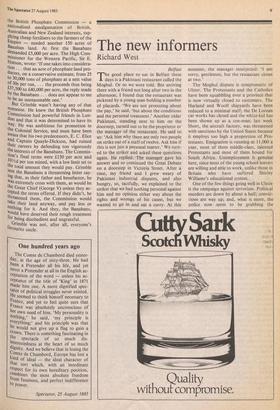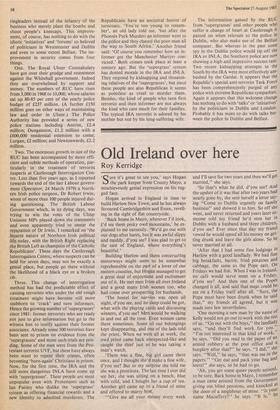The new informers
Richard West
Belfast
The good place to eat in Belfast these days is a Pakistani restaurant called the Moghul. Or so we were told. But arriving there with a friend not long after two in the afternoon, I found that the restaurant was picketed by a young man holding a number of placards. 'We are not protesting about the pay,' he said, 'but about the conditions and the personal treatment.' Another older Pakistani, standing next to him on the doorstep, turned out to be the proprietor or the manager of the restaurant. He said to us: 'Ask him why there are only two people on strike out of a staff of twelve. Ask him if this is not just a personal matter.' We turn- ed to the striker and asked these questions again. He replied. The manager gave his answer and so continued the Great Debate on a doorstep in Victoria Street. After a time, my friend and I grew weary of Pakistani industrial disputes, and also hungry, so, tactfully, we explained to the striker that we had nothing personal against him and no opinion either way about the rights and wrongs of his cause, but we wanted to go in and eat a curry. At this
moment, the manager interjected: 'I am sorry, gentlemen, but the restaurant closes at two.'
The Moghul dispute is symptomatic of Ulster. The Protestants and the Catholics have been squabbling over a province that is now virtually closed to customers. The Harland and Woolf shipyards have been reduced to a minimal staff; the De Lorean car works has closed and the whizz-kid has been shown up as a con-man; last week Short, the aircraft factory, was threatened with sanctions by the United States because it employs too high a proportion of Pro- testants. Emigration is running at 11,000 a year, most of them middle-class, talented Protestants and most of them bound for South Africa. Unemployment is genuine here, since most of the young school leavers are willing and able to work, unlike those in Britain who have suffered Shirley Williams's educational system.
One of the few things going well in Ulster is the campaign against terrorism. Political murders are down by about a half; convic- tions are way up; and, what is more, the police now seem to be grabbing the ringleaders instead of the infantry of the business who merely plant the bombs and shoot people's kneecaps. This improve- ment, of course, has nothing to do with the idiotic 'initiatives' and 'forums' so beloved of politicians in Westminster and Dublin and even to some extent Belfast. The im- provement in security comes from four things.
One. The Royal Ulster Constabulary have got over their grudge and resentment against the Whitehall government. Indeed they are overwhelmed by support and money. The numbers of RUC have risen from 3,000 in 1968 to 10,000, whose salaries eat up 80-85 per cent of the yearly police budget of £237 million. (A further £150 million goes on other ways of maintaining law and order in Ulster.) The Police Authority has provided a series of new police stations including Antrim, £2.4 million; Dungannon, £1.2 million with a £600,000 residential extension to come; Lurgan, £2 million; and Newtonwards, £2.2 million.
Two. The enormous growth in size of the RUC has been accompanied by more effi- cient and subtle methods of operation, par- ticularly in the treatment of terrorist suspects at Castlereagh Interrogation Cen- tre. Less than five years ago, as I reported towards the end of the last Labour govern- ment (Spectator, 24 March 1979) a North- ern Irish police surgeon, Dr Robert Irwin, wrote of more than 100 people injured dur- ing questioning. The British Labour Government which, in its dying days, was trying to win the votes of the Ulster Unionist MPs played down the statements and even apparently tried to smear the reputation of Dr Irwin. I remarked on 'the _bizarre nature of Northern Irish political life today, with the British Right replacing the British Left as champion of the Catholic Republicans'. These days the Castlereagh Interrogation Centre,' where suspects can be held for seven days, may not be exactly a genial place, but people go there without the likelihood of a black eye or a broken rib.
Three. This change of interrogation method has had the predictable effect of causing terrorists who under the old rough treatment might have become still more stubborn to 'crack' and turn informers. Hence the growing number of 'supergrasses' since 1981: former terrorists who are ready not just to give information but go in the witness box to testify against their former associates. Already some 300 terrorists have been sent to prison on evidence from the `supergrasses' and more such trials are pen- ding. Some of the men were from the Pro- testant terrorist UVF, but these have always been wont to repent their crimes, often becoming 'born-again' Christians in prison.
Now, for the first time, the IRA and the still more dangerous INLA have come up with 'supergrasses'. These people are most unpopular even with Protestants such as Ian Paisley who dislike the 'supergrass' system as offering financial rewards and a new identity to admitted murderers. The Republicans have an ancestral horror of turncoats. 'You're too young to remem- ber', an old lady told me, 'but after the Phoenix Park Murders an informer went to the police and they chased the poor man all the way to South Africa.' Another friend said: 'Of course you remember how an in- former got the Manchester Martyrs con- victed.' Both crimes took place at least a century ago. But the 'supergrass' system has dented morale in the IRA and INLA. They respond by kidnapping and threaten- ing relatives of the 'supergrasses', but since these people are also Republican it seems as pointless as cruel to murder them. Besides, the kind of people who turn first terrorist and then informer are not always the kind who care much for their families. The typical IRA terrorist is adored by his mother but not by his long-suffering wife.
The information gained by the RUC from 'supergrasses' and other people who suffer a change of heart at Castlereagh is passed on when relevant to the police in Dublin, who also make use of the Belfast computer. But whereas in the past some spy in the Dublin police would tip off the IRA or INLA, the Southern police are now showing a high and impressive success rate. Two recent kidnapping attempts in the South by the IRA were most effectively am- bushed by the Gardai. It appears that the Republic's special anti-terrorist Task Force has been comprehensively purged of any police with extreme Republican sympathies. Again it appears that this welcome change has nothing to do with 'talks' or 'initiatives' by the politicians in Dublin and London. Probably it has more to do with talks bet- ween the police in Dublin and Belfast.



































 Previous page
Previous page